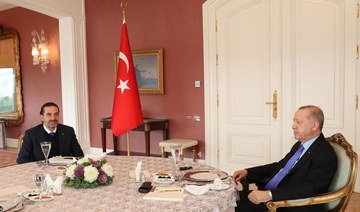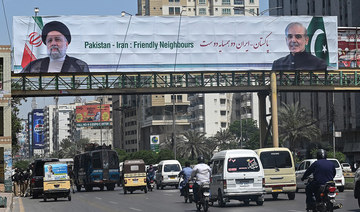BEIRUT: Lebanon’s politicians swapped insults and accusations on Friday while coronavirus infections in the country continued to rise dramatically, with almost 5,000 cases reported in a single day.
Journalists, artists, doctors, nurses, soldiers and teachers — some in their 20s and 30s — were among those falling victim to the virus, while hospitals struggled to cope with the influx of cases and health officials warned of a growing crisis.
On Thursday night, former minister Nicolas Nahas appeared on TV after recovering from the illness. “The last two months have been very difficult. I lost the ability to breathe,” he said.
As a nationwide 25-day lockdown entered its second day, politicians exchanged accusations over delays in the naming of a Cabinet, escalating the conflict between President Michel Aoun and Prime Minister-designate Saad Hariri over conditions imposed by the president.
MP Waleed Al-Baarini, a member of the Future Movement, accused Aoun’s Free Patriotic Movement of “tyranny and adopting a scorched earth policy.”
Lebanon “does not need another trigger to destroy it,” he said.
On Friday, the political conflict went beyond the Cabinet line-up to include the issue of parliamentary rights.
Aoun told members of the Constitutional Council that the body should not be limited to monitoring laws, but should also interpret the constitution in accordance with reforms agreed under the 1989 Taif accord.
The president’s comments angered many MPs, including former PM Najib Mikati and parliamentary speaker Nabih Berri, who said: “The role of the council is limited to monitoring the constitutionality of laws. Interpreting the constitution is the sole right of the parliament.”
Marwan Hamadeh, who resigned as an MP, described Aoun’s remarks as a breach of the constitution and an attempt to abolish its rights.
“This takes us back to the Lebanese civil war,” he said.
However, Khaled Qabbani, an authority on the country’s constitution and former member the Constitutional Council, told Arab News that “the Taif agreement gave (the council) the right to interpret the constitution, along with the right to the monitor the constitutionality of laws and the parliamentary elections.”
Qabbani said that he had been assigned to write the constitutional text of amendments approved by the accord.
“However, when the parliament convened one year later to approve these amendments, Georges Saade (the late Christian Phalange party leader) did not agree to give this right to the Constitutional Council, and his view was supported by all other MPs. All the amendments were approved except this one.”
Qabbani said that he was surprised “that this matter is being discussed again, especially at this time, when the constitution in Lebanon is not being respected, and the parliament has become very sensitive to all topics related to its rights and powers.”
“Such a mistake is not acceptable,” he said.
In a televised interview on Thursday night, Druze leader Walid Jumblatt called on Hariri to step down from the task of forming a government, and to “leave Hezbollah and its allies to rule the country, since we have become a missile silo.”
“We are not able to rule. Let the resistance camp handle the responsibility of the country in times of peace, war and economic collapse,” he said.
He urged Hezbollah “to think about the tens of thousands of Lebanese in the Gulf countries in order to avoid their deportation, since they have become our only hope amid the economic crisis.”
‘Tyranny’ warning as Lebanon’s political row escalates
https://arab.news/8b7qg
‘Tyranny’ warning as Lebanon’s political row escalates

- As a nationwide 25-day lockdown entered its second day, politicians exchanged accusations over delays in the naming of a Cabinet
- Hospitals in the country are struggling to cope with the influx of cases
Israel lacks ‘credible plan’ to safeguard Rafah civilians, says Blinken

Speaking to ABC News’ This Week, Blinken said that President Joe Biden remains determined to help Israel defend itself and that the shipment of 3,500 2,000-pound and 500-pound bombs was the only US weapons package being withheld.
That could change, he said, if Israel launches a full-scale attack on Rafah, which Israel says it plans to invade to root out fighters of the ruling Hamas militant group.
Biden has made clear to Israel that if it “launches this major military operation to Rafah, then there are certain systems that we’re not going to be supporting and supplying for that operation,” said Blinken.
“We have real concerns about the way they’re used,” he continued. Israel needs to “have a clear, credible plan to protect civilians, which we haven’t seen.”
Rafah is hosting some 1.4 million Palestinians, most of them displaced from elsewhere in Gaza by fighting and Israeli bombardments, amid dire shortages of food and water.
The death toll in Israel’s military operation in Gaza has now passed at least 35,000 Palestinians, according to Gaza’s Hamas-run health ministry.
The war was triggered by the Hamas-led attack on southern Israel on Oct. 7 in which some 1,200 people were killed and more than 250 people taken hostage, according to Israeli tallies.
Israel says 620 soldiers have been killed in the fighting.
Dubai laboratory develops AI technology to detect Legionella bacteria

- The AI system works by pinpointing live colonies of the bacteria
DUBAI: Dubai Central Laboratory has developed an artificial intelligence technology able to detect Legionella pulmonary bacteria, the first of its type in the Middle East region, the Emirates News Agency reported on Sunday.
The system works by pinpointing live colonies of the bacteria, which causes a variety of acute respiratory infections, and delivers examination results with an accuracy rate in quantifying bacterial counts of 99 percent, the report said.
The technology also streamlines work processes by reducing reliance on laboratory supplies, leading to faster completion times.
“This revolutionary method of detecting Legionella pulmonary bacteria is among the latest to be accredited globally by the European Water Testing Network. It also has a certificate of recognition from AOAC International,” Hind Mahmoud Ahmed, director of the Dubai Central Laboratory Department, said.
“The technology is very accurate and quick to produce results, typically needing 48 hours as opposed to the 14 days that traditional methods require.”
Laboratories conduct more than 100,000 tests every year to ensure the safety of various goods sold in Dubai.
UN chief calls for ‘immediate’ Gaza ceasefire, hostage release

- Israeli strikes on Gaza continued Sunday after it expanded evacuation order for Rafah operation
- Gaza war tearing families apart, rendering people homeless, hungry and traumatized, says UN chief
KUWAIT CITY: UN Secretary-General Antonio Guterres on Sunday urged an immediate halt to the Israel-Hamas war in Gaza, the return of hostages and a “surge” in humanitarian aid to the besieged Palestinian territory.
“I repeat my call, the world’s call for an immediate humanitarian ceasefire, the unconditional release of all hostages and an immediate surge in humanitarian aid,” Guterres said in a video address to an international donors’ conference in Kuwait.
“But a ceasefire will only be the start. It will be a long road back from the devastation and trauma of this war,” he added.
Israeli strikes on Gaza continued on Sunday after it expanded an evacuation order for Rafah despite international outcry over its military incursion into eastern areas of the city, effectively shutting a key aid crossing.
“The war in Gaza is causing horrific human suffering, devastating lives, tearing families apart and rendering huge numbers of people homeless, hungry and traumatized,” Guterres said.
His remarks were played at the opening of the conference in Kuwait organized by the International Islamic Charitable Organization (IICO) and the UN’s humanitarian coordination organization OCHA.
On Friday, in Nairobi, the UN head warned Gaza faced an “epic humanitarian disaster” if Israel launched a full-scale ground operation in Rafah.
Gaza’s bloodiest-ever war began following Hamas’s unprecedented October 7 attack on Israel that resulted in the deaths of more than 1,170 people, mostly civilians, according to an AFP tally of Israeli official figures.
Vowing to destroy Hamas, Israel launched a retaliatory offensive that has killed more than 34,971 people in Gaza, mostly women and children, according to the Hamas-run territory’s health ministry.
UN chief calls for ‘immediate’ Gaza ceasefire, hostage release

- UN chief: ‘The war in Gaza is causing horrific human suffering, devastating lives, tearing families apart and rendering huge numbers of people homeless, hungry and traumatized’
KUWAIT CITY: UN Secretary-General Antonio Guterres on Sunday urged an immediate halt to the Israel-Hamas war in Gaza, the return of hostages and a “surge” in humanitarian aid to the besieged Palestinian territory.
“I repeat my call, the world’s call for an immediate humanitarian ceasefire, the unconditional release of all hostages and an immediate surge in humanitarian aid,” Guterres said in a video address to an international donors’ conference in Kuwait.
“But a ceasefire will only be the start. It will be a long road back from the devastation and trauma of this war,” he added.
Israeli strikes on Gaza continued on Sunday after it expanded an evacuation order for Rafah despite international outcry over its military incursion into eastern areas of the city, effectively shutting a key aid crossing.
“The war in Gaza is causing horrific human suffering, devastating lives, tearing families apart and rendering huge numbers of people homeless, hungry and traumatized,” Guterres said.
His remarks were played at the opening of the conference in Kuwait organized by the International Islamic Charitable Organization (IICO) and the UN’s humanitarian coordination organization OCHA.
On Friday, in Nairobi, the UN head warned Gaza faced an “epic humanitarian disaster” if Israel launched a full-scale ground operation in Rafah.
Gaza’s bloodiest-ever war began following Hamas’s unprecedented October 7 attack on Israel that resulted in the deaths of more than 1,170 people, mostly civilians, according to an AFP tally of Israeli official figures.
Vowing to destroy Hamas, Israel launched a retaliatory offensive that has killed more than 34,971 people in Gaza, mostly women and children, according to the Hamas-run territory’s health ministry.
Iran conservatives tighten grip in parliament vote

- Elected members are to choose a speaker for the 290-seat parliament when they begin their work on May 27
- Conservatives won the majority of the 45 remaining seats up for grabs in the vote held in 15 of 31 provinces: local media
TEHRAN: Iran’s conservatives and ultra-conservatives clinched more seats in a partial rerun of the country’s parliamentary elections, official results showed Saturday, tightening their hold on the chamber.
Voters had been called to cast ballots again on Friday in regions where candidates failed to gain enough votes in the March 1 election, which saw the lowest turnout — 41 percent — since the 1979 Islamic Revolution.
Candidates categorized as conservative or ultra-conservative on pre-election lists won the majority of the 45 remaining seats up for grabs in the vote held in 15 of Iran’s 31 provinces, according to local media.
For the first time in the country, voting on Friday was a completely electronic process at eight of the 22 constituencies in Tehran and the cities of Tabriz in the northwest and Shiraz in the south, state TV said.
“Usually, the participation in the second round is less than the first round,” Interior Minister Ahmad Vahidi told reporters in Tehran, without specifying what the turnout was in the latest round.
“Contrary to some predictions, all the candidates had a relatively acceptable and good number of votes,” he added.
Elected members are to choose a speaker for the 290-seat parliament when they begin their work on May 27.
In March, 25 million Iranians took part in the election out of 61 million eligible voters.
The main coalition of reform parties, the Reform Front, had said ahead of the first round that it would not participate in “meaningless, non-competitive and ineffective elections.”
The vote was the first since nationwide protests broke out following the September 2022 death in custody of Mahsa Amini, a 22-year-old Iranian Kurd, arrested for allegedly breaching the Islamic republic’s strict dress code for women.
In the 2016 parliamentary elections, first-round turnout was above 61 percent, before falling to 42.57 percent in 2020 when elections took place during the Covid pandemic.


















